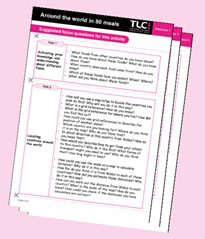 |
Learners are asked to activate their prior knowledge and understanding about different foods and cuisines from around the world and to locate the countries associated with those cuisines on maps and atlases. Each group of learners researches a different world cuisine, producing a historical time line to show influences on the cuisine and report their findings to the class in the form of a planned two minute presentation. |
Humanities
Enquiry, exploration and investigation inspire curiosity about the world, its past, present and future.
Events and human experiences are complex, and are perceived, interpreted and represented in different ways.
Our natural world is diverse and dynamic, influenced by processes and human actions.
Human societies are complex and diverse, and shaped by human actions and beliefs.
Languages, literacy and communication
Languages connect us.
Understanding languages is key to understanding the world around us.
Expressing ourselves through languages is key to communication.
LNF - Listening, Reading, Speaking, Writing; Mathematical Proficiency, Number system, Geometry and Measurement, Statistics.
DCF - Producing.
Creativity and innovation; Critical thinking and problem solving; Personal effectiveness; Planning and organising.
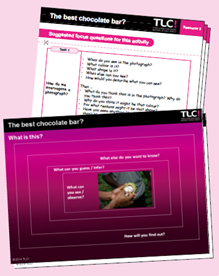 |
Learners interrogate a photograph of a cocoa pod split in half, which appears at the centre of a source square. Learners use observation and inference skills and are expected to formulate ‘good’ questions. They gather information about the photograph through research, before developing and creating a scientific presentation to show their findings. Learners are then set the problem of finding out the favourite chocolate bar of people in school. They generate and consider ideas about how to do this, before developing and following a plan to gather and analyse the information needed to work out what chocolate bar is the favourite. |
Science and Technology
Being curious and searching for answers is essential to understanding and predicting phenomena.
The world around us is full of living things which depend on each other for survival.
Health and Well-being
Our decision-making impacts on the quality of our lives and the lives of others.
LNF - Listening, Reading, Speaking, Writing; Mathematical Proficiency, Number system, Statistics.
DCF - Producing.
Creativity and innovation; Critical thinking and problem solving; Personal effectiveness; Planning and organising.
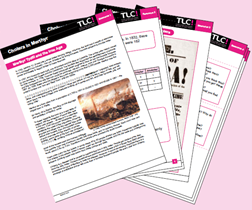 |
Learners read a text about Merthyr and the Iron Age and use the information to draw a timeline to scale showing how Merthyr became the world’s top iron producer. Reading about the living conditions in the town, learners are introduced to cholera as a disease that quickly spreads in overcrowded conditions with poor sanitation. They interrogate numerical information about the outbreaks of cholera in Merthyr Tydfil and finally produce a public health poster that aims to reduce the spread of the disease. |
Science and Technology
Being curious and searching for answers is essential to understanding and predicting phenomena.
The world around us is full of living things which depend on each other for survival.
Humanities
Enquiry, exploration and investigation inspire curiosity about the world, its past, present and future.
Events and human experiences are complex, and are perceived, interpreted and represented in different ways.
Expressive arts
Creating combines skills and knowledge, drawing on the senses, inspiration and imagination.
Health and Well-being
Our decision-making impacts on the quality of our lives and the lives of others.
LNF - Listening, Reading, Speaking, Writing; Mathematical Proficiency, Number system, Statistics.
Creativity and innovation; Critical thinking and problem solving; Personal effectiveness; Planning and organising.
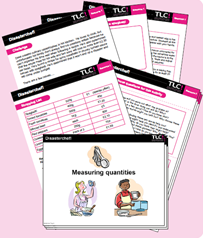 |
Learners are given a series of problems in the real-life context of cooking a meal to a timescale and budget. Working collaboratively, they plan and develop a strategy to organise the steps of a given recipe and how best to coordinate the activities involved in preparing the meal. Learners locate and extract relevant information from text in order to make decisions about timings and represent these (using a timeline at the higher end). Learners develop innovative strategies to measure quantities to the most appropriate level of precision afforded by the equipment provided and are encouraged to link ideas, apply lateral thinking, estimate values and apply their numerical reasoning to practical problems. They apply number skills to calculate the cost of the meal to see if it meets budget criteria and amend the original recipe to scale quantities up or down accordingly using ideas of ratio and proportion. |
Science and Technology
Being curious and searching for answers is essential to understanding and predicting phenomena.
Design thinking and engineering offer technical and creative ways to meet society’s needs and wants.
Mathematics and Numeracy
The number system is used to represent and compare relationships between numbers and quantities.
Geometry focuses on relationships involving shape, space and position, and measurement focuses on quantifying phenomena in the physical world.
Health and Well-being
Our decision-making impacts on the quality of our lives and the lives of others.
LNF - Listening, Reading, Speaking, Writing; Mathematical Proficiency, Number system, Measurement.
Creativity and innovation; Critical thinking and problem solving; Personal effectiveness; Planning and organising.
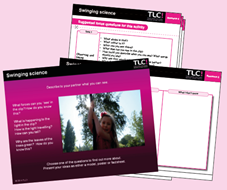 |
Learners interrogate a video of child on a swing. They formulate and investigate questions using their observations and critical and creative thinking skills. Learners research questions and ideas, drawing conclusions about forces, light or photosynthesis and communicate these conclusions and the reasoning behind them to the rest of the class through a choice of media. Metacognition is integral to this task and on-going reflection ensures higher order thinking. |
Science and Technology
Being curious and searching for answers is essential to understanding and predicting phenomena.
The world around us is full of living things which depend on each other for survival.
Forces and energy provide a foundation for understanding our universe.
Language, Literacy and Communication
Languages connect us.
Expressing ourselves through languages is key to communication.
LNF - Listening, Reading, Speaking, Writing; Mathematical Proficiency, Number system, Measurement.
DCF - Producing.
Creativity and innovation; Critical thinking and problem solving; Personal effectiveness; Planning and organising.
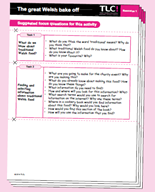 |
Learners activate their prior knowledge and understanding and carry out research about traditional Welsh food and recipes. They choose a traditional Welsh food that they will make for a charity event in school and create a recipe for it, focusing on instructional writing. Learners work out how much food they will bake, create a shopping list and buy the ingredients. They use receipts to work out how much has been spent and the unit cost of their product. Learners bake their food and sell it as part of the charity event, keeping a record of how much they sell and calculating the profit they make. |
Science and Technology
Being curious and searching for answers is essential to understanding and predicting phenomena.
The world around us is full of living things which depend on each other for survival.
Humanities
Enquiry, exploration and investigation inspire curiosity about the world, its past, present and future.
Events and human experiences are complex, and are perceived, interpreted and represented in different ways.
Health and Well-being
Our decision-making impacts on the quality of our lives and the lives of others.
LNF - Listening, Reading, Speaking, Writing; Mathematical Proficiency, Number system, Measurement, Statistics.
DCF - Producing.
Creativity and innovation; Critical thinking and problem solving; Personal effectiveness; Planning and organising.
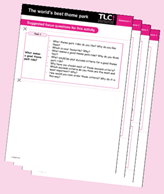 |
Learners are asked to activate their prior knowledge and understanding and to determine success criteria about what makes a good theme park ride. They develop ideas for a new theme park ride and use these to invent and design their ride. They name the new ride and design the world’s best theme park that features their new ride as its centrepiece, presenting their ideas as a web page. Finally, they develop a projected turnover figure for the new theme park. |
Science and Technology
Being curious and searching for answers is essential to understanding and predicting phenomena.
Design thinking and engineering offer technical and creative ways to meet society’s needs and wants.
Forces and energy provide a foundation for understanding our universe.
Expressive arts
Responding and reflecting, both as artist and audience, is a fundamental part of learning in the expressive arts.
Creating combines skills and knowledge, drawing on the senses, inspiration and imagination.
LNF - Listening, Reading, Speaking, Writing; Mathematical Proficiency, Number system, Geometry and Measurement, Statistics.
DCF - Producing, Data and computational thinking.
Creativity and innovation; Critical thinking and problem solving; Personal effectiveness; Planning and organising.
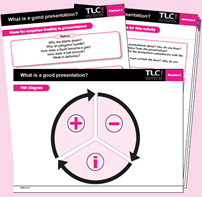 |
Learners watch a video clip of children presenting findings from an enquiry entitled ‘What is this?’. They identify the positive, negative and interesting points about the presentation. Learners use these observations and their prior learning to develop success criteria for ‘What makes a good presentation?’. Learners create their own presentation and review their success criteria as an on-going process, justifying their reasoning. They are peer assessed as they make their presentations and through focused reflection, learners refine their criteria for future use. |
Science and Technology
Being curious and searching for answers is essential to understanding and predicting phenomena.
Design thinking and engineering offer technical and creative ways to meet society’s needs and wants.
The world around us is full of living things which depend on each other for survival.
Matter and the way it behaves defines our universe and shapes our lives.
Forces and energy provide a foundation for understanding our universe.
Humanities
Enquiry, exploration and investigation inspire curiosity about the world, its past, present and future.
Events and human experiences are complex, and are perceived, interpreted and represented in different ways.
Our natural world is diverse and dynamic, influenced by processes and human actions.
Human societies are complex and diverse, and shaped by human actions and beliefs.
Informed, self-aware citizens engage with the challenges and opportunities that face humanity, and are able to take considered and ethical action.
Health and Well-being
Developing physical health and well-being has lifelong benefits.
How we process and respond to our experiences affects our mental health and emotional well-being.
Our decision-making impacts on the quality of our lives and the lives of others.
Healthy relationships are fundamental to our well-being.
LNF - Listening, Reading, Speaking, Writing.
DCF - Producing.
Creativity and innovation; Critical thinking and problem solving; Personal effectiveness; Planning and organising.
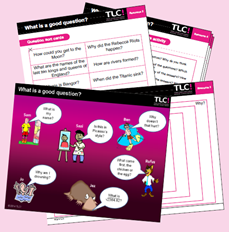 |
Learners develop success criteria for quality questions and use a series of short tasks to activate their prior understanding and build on it. They are posed challenging questions that ensure their success criteria and the justification for them is as high level as possible. Having developed and refined their success criteria, learners evaluate other groups’ criteria before making final amendments to their own success criteria for using in the future. |
This activity has been written to improve learners’ generic questioning skills and therefore can fit into any area or any combination of areas of learning and experience.
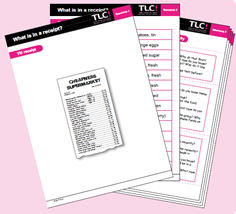 |
Learners review a supermarket receipt in terms of food groups and types, and develop their numeracy skills through some simple calculations. Following research about recipes, learners create a menu for a ‘healthy meal’ and use it to work out the items and the quantities of each required. Learners research relevant prices and use their findings to draw conclusions about the healthiest and cheapest two course meal for six people. Their menu, and the reasoning behind choosing it, is communicated to the rest of the class through a poster or leaflet. If at all possible, learners should be allowed to make their meal, as they will find this whole activity more rewarding and therefore be better engaged. Throughout the activity, learners work in pairs. |
Science and Technology
Being curious and searching for answers is essential to understanding and predicting phenomena.
Health and Well-being
Developing physical health and well-being has lifelong benefits.
Mathematics and Numeracy
The number system is used to represent and compare relationships between numbers and quantities.
Geometry focuses on relationships involving shape, space and position, and measurement focuses on quantifying phenomena in the physical world.
LNF - Listening, Reading, Speaking, Writing; Mathematical Proficiency, Number system, Geometry and Measurement.
DCF - Producing.
Creativity and innovation; Critical thinking and problem solving; Personal effectiveness; Planning and organising.
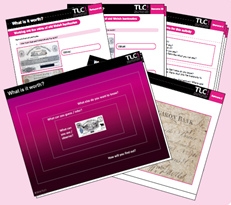 |
Learners use a source square to interrogate an image of a historical Welsh banknote and formulate quality questions using their observations. They research these questions, draw conclusions and calculate the current value of old banknotes, before designing their own modern day Welsh banknote. |
Humanities
Enquiry, exploration and investigation inspire curiosity about the world, its past, present and future.
Events and human experiences are complex, and are perceived, interpreted and represented in different ways.
Expressive arts
Responding and reflecting, both as artist and audience, is a fundamental part of learning in the expressive arts.
Creating combines skills and knowledge, drawing on the senses, inspiration and imagination.
LNF - Listening, Reading, Speaking, Writing; Mathematical Proficiency, Number system.
DCF - Producing, Data and computational thinking.
Creativity and innovation; Critical thinking and problem solving; Personal effectiveness; Planning and organising.
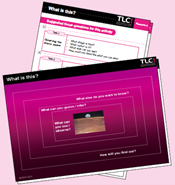 |
Learners use a source square to interrogate an image of space. They formulate quality questions using their observations, ensuring that the science used is logical, reliable and accurate. Findings are gathered through researching their own questions and drawing conclusions. These conclusions, and the reasoning behind them, are communicated to the rest of the class through a two minute presentation in a medium of their own choice. |
Science and Technology
Being curious and searching for answers is essential to understanding and predicting phenomena.
Expressive arts
Responding and reflecting, both as artist and audience, is a fundamental part of learning in the expressive arts.
LNF - Listening, Reading, Speaking, Writing.
DCF - Producing.
Creativity and innovation; Critical thinking and problem solving; Personal effectiveness; Planning and organising.
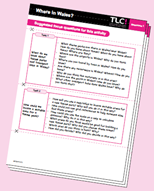 |
Learners are asked to activate their prior knowledge and understanding about theme parks in and near Wales and the main transport systems in and around Wales. They consider where in Wales would be the best area to build a new theme park and apply their knowledge and understanding about the possible steps that need to be taken when building something new. Learners decide on an exact location for a theme park and present their proposal in the form of a display. |
Science and Technology
Being curious and searching for answers is essential to understanding and predicting phenomena.
Design thinking and engineering offer technical and creative ways to meet society’s needs and wants.
Humanities
Enquiry, exploration and investigation inspire curiosity about the world, its past, present and future.
Our natural world is diverse and dynamic, influenced by processes and human actions.
Expressive arts
Creating combines skills and knowledge, drawing on the senses, inspiration and imagination.
LNF - Listening, Reading, Speaking, Writing; Mathematical Proficiency, Number system, Geometry and Measurement.
DCF - Producing.
Creativity and innovation; Critical thinking and problem solving; Personal effectiveness; Planning and organising.